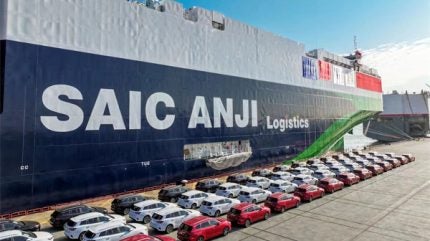
The European Commission (EC) has reduced the maximum level of additional import tariffs it proposes to apply to battery electric vehicles (BEVs) imported from China to just under 38%, from 48% announced in June, as it looks to continue to protect EU automakers from products heavily subsidised by the Chinese government.
The EC confirmed the new import tariff rates would be applied for a period of five years from November, with the effective rate varying between companies depending on the perceived level of government support and their collaboration with the EC’s investigation.

Discover B2B Marketing That Performs
Combine business intelligence and editorial excellence to reach engaged professionals across 36 leading media platforms.
The punitive tariffs applying to Chinese BEVs are on top of the EU’s standard 10% common external tariff on new car imports from outside the bloc.
Under new proposals announced this week BEVs made by China’s leading privately-owned new energy vehicle (NEV) manufacturer BYD Auto would incur an import tariff of 17%, while for privately-owned Geely Auto the new tariff is set at 19.3%. State-owned automaker SAIC Motor would incur an import tariff of 36.3%, slightly below the maximum tariff rate of 37.6%.
Vehicles produced in China by Tesla would incur an import tariff rate of 9%, much lower than the 20.8% rate the EC announced in June, with the US-based company is seen as not having benefited from Chinese government subsidies to the same extent as domestic producers.
The EC said that before it imposes the tariffs in November it will accept “input” from interest parties until the end of August, before seeking approval from EU member states by the end of October. Once introduced, the tariffs will be definitive for a period of five years.
Brussels was confident these measures are compatible with World Trade Organisation (WTO) regulations, after the Chinese government filed a complaint last month. An EC official told reporters: “the EU is open to reaching an alternative solution to the imposition of duties – one that would be effective and WTO-compatible.”






